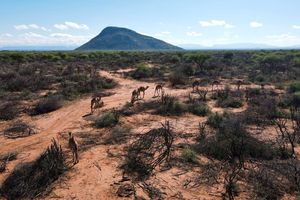
Then CEO of Kamuthi Housing Co-operative Society Harrison Murakaru (holding phone) and board secretary Eliud Njoroge (on his right) take a selfie photo with some of the 1,000 investors who received their title deeds on April 13, 2019 at an event held at the firm’s office in Maziwa.
In its prime, Kamuthi Housing Co-operative Society was a powerhouse, having started in 1964 as Kahawa Farmers’ Co-operative Society, with a key focus on buying land and selling it back to its members at a fair price.
The co-operative also had an option of building modest houses for its members, who were then coffee farmers and the emerging middle class.
Their marketing strategy was vibrant, utilising print, radio, and television to create the illusion of an impeccable lifestyle in the outskirts of Nairobi.
Read: Succession dispute over late Eldoret evangelist Edward Limo’s Sh3bn estate takes new legal twist
Thousands of members and external investors were attracted by the concept, with many hurriedly investing in Kamuthi, hoping for higher returns.
For instance, thousands of investors parted with millions of shillings to buy into the Buffalo Hills Golf and Leisure Village in Thika, Kiambu County — a 1,233-acre project that promised a mixed-use development featuring presidential suites, a nine-hole golf course, a man-made recreational dam and marina, a shopping centre, and other luxuries overlooking the stunning Kilimambogo.
Today, the project, which Kamuthi valued at Sh4.2 billion, is vulnerable and at the centre of an auction battle with Sidian Bank after the property was used as security to secure close to Sh700 million—a debt the cash-strapped co-operative society has been struggling to repay.
Mr Barack Okomba is one of the investors who bought into the Buffalo Hills Golf and Leisure Village project through his daughter, Ms Bilha Nangira.
He purchased seven plots nearly eight years ago, but he has yet to receive some of the title deeds despite parting with close to Sh7 million.
"Even with some of the title deeds I have received from Buffalo Hills Golf and Leisure Village after chasing them for years, I cannot develop anything. There is no infrastructure, and there is nothing tangible to attract any investor to put in money. I have been chasing the title deed under my daughter's name, and I have given up, yet I have paid everything," Mr Okomba told Nation.Africa.
Mr Okomba's frustrations are shared by many other investors who have formed WhatsApp groups—some of which Nation.Africa has been embedded in—to deliberate on how they can secure their title deeds in the absence of Kamuthi’s intervention.
Mr Jeff Thuki is another frustrated investor who bought land through Kamuthi Housing Co-operative Society at Soya Dam Estate in Murang’a County. Nearly10 years later, he has yet to receive his title deeds.
He told Nation.Africa that he has lost count of the number of times he has visited Kamuthi’s offices seeking either his title deed or a refund.
"What I have is worthless papers in the form of an agreement that cannot help me. I hope one day I will get justice and receive my title deed because I have completed paying everything," Mr Thuki said.
Nation.Africa analysed media interviews in which Kamuthi Housing Co-operative Society Chairman Bernard Maina had previously assured investors that the Buffalo Hills Golf and Leisure Village project, among others, would soon be completed.
However, on the ground, no progress has been made.
On Thursday January 30, in an interview with Nation.Africa, Mr Maina sounded like a man on the brink of giving up, likening his situation to robbing Peter to pay Paul.
"I admit we have deep financial challenges, and we are behind schedule in delivering most of our projects to our customers. We owe banks a lot of money. For instance, our Soya Dam Estate project in Gatanga, which spans 493 acres, was financed by Co-operative Bank to the tune of over Sh500 million. The land was used as security, and we have been unable to pay. As a result, close to or more than1,000 people are yet to receive their title deeds. The uptake of the project was not as strong as expected," Mr Maina said.
He acknowledged that the Buffalo Hills Golf and Leisure Village in Thika, Kiambu County — a multi-billion-shilling project — has faced myriad financial challenges with its financier, Sidian Bank. Kamuthi borrowed almost Sh600 million, including interest, but has struggled to repay the debt, leaving nearly 1,100 buyers without title deeds.
Revision of contract
Sidian Bank has repeatedly advertised the multi-billion-shilling project for auction, and Kamuthi Housing Co-operative Society has been at the bank's mercy, seeking loan repayment extensions and even pleading with customers to top up payments for their plots to reduce arrears owed to the lender.
However, most investors have rejected the plea, viewing it as a revision of the contract midway.
But what really went wrong?
Insiders who have previously sat on Kamuthi’s board say the society’s downfall resulted from overambitious expansion, an overestimation of product uptake, and an over-reliance on using its properties as collateral for bank loans.
They also pointed to issues such as unregulated withdrawal of funds, the on-boarding of inexperienced personnel, and excessive borrowing from banks.
Kamuthi denies the latter claim.
However, Mr Maina's fear that Kamuthi is in trouble is apparent throughout the interview.
Late last month, Kamuthi Housing Co-operative Society suffered a significant blow after losing control of 176 acres worth Sh10 billion in Kahawa West, Nairobi.
The Court of Appeal upheld an earlier ruling in favour of Nairobi County, declaring it the legitimate owner of the vast land and property. The case had been in court for over 33 years.
Mr Maina told Nation.Africa that he had hoped the appeal ruling would favour Kamuthi, allowing it to liquidate the investment and offset its bad debts.
The contested property hosts schools, commercial and residential properties, a public market, and undeveloped land.
The Sh10 billion valuation is based on court filings by a government land valuer.
The dispute between Kamuthi and Nairobi City Council dates back to 1973 when the council purchased 154.5 acres under L.R No.71/7 for Sh135,000.
On March 26, 1980, it acquired an additional 21.238 acres for Sh425,000 from Kahawa Farmers' Co-operative Society.
The first parcel was developed into a housing scheme, while the second was turned into a sewage plant to serve the estate.
Kamuthi claimed ownership of the contested land, arguing that it inherited the property as the successor to Kahawa Farmers’ Co-operative Society, which was liquidated in 1989.
However, on June 4, 2020, Justice L. Komingoi ruled in favour of Nairobi County, stating that Kamuthi Farmers’ Co-operative Society had illegally acquired the two parcels of land, which rightfully belonged to the county.
The court ordered Kamuthi to transfer the land back to Nairobi County.
Kamuthi appealed, but on January 24, 2025, a three-judge bench, comprising Justices Musinga, P. Asike-Makhandia, and Kantai, upheld the earlier ruling.
The judges noted that there was overwhelming evidence, including witness statements and affidavits from Kahawa Farmers’ Co-operative Society managers, land valuers, surveyors, and the chief county officer for lands, all of whom affirmed that Kamuthi had no legitimate claim to the property.
"It is a situation where parties, most likely friends, in good faith, enter into agreements, but documents are not perfected. Successors lose sight of the original intentions and pursue causes that the original parties never contemplated," the judges stated while dismissing Kamuthi’s appeal with costs.
Law firm Wanjiku Maina & Co. Advocates, which represented Nairobi County, noted that the ruling was a relief for individuals who had purchased land and houses from the county but had never been issued title deeds.
Kamuthi has since announced plans to challenge the ruling at the Supreme Court.










